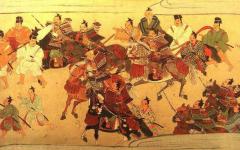Friend of my harsh days,
My decrepit dove!
Alone in the wilderness of pine forests
You've been waiting for me for a long, long time.
You are under the window of your little room
You're grieving like you're on a clock,
And the knitting needles hesitate every minute
In your wrinkled hands.
You look through the forgotten gates
On a black distant path;
Longing, premonitions, worries
They squeeze your chest all the time.
Yakovleva Arina Rodionovna was born on April 10 (21), 1758 in the village of Lampovo, St. Petersburg province. Her parents were serfs and had six more children. Her real name was Irina, but her family used to call her Arina. She received her surname from her father Yakovlev, later it became Matveev after her husband. Pushkin never called her by name; “nanny” was closer to him. From the memoirs of Maria Osipova, “an extremely respectable old lady - plump-faced, all gray-haired, passionately loving her pet...”
In 1759, Lampovo and the surrounding villages were bought by A.P. Hannibal, Pushkin's great-grandfather. In 1792, Pushkin’s grandmother Maria Alekseevna took Arina Rodionovna as a nanny for her nephew Alexei. For good service in 1795, Maria Alekseevna gave her nanny a house in the village. And in December 1797, a girl was born into the Hannibal family, who was named Olga (the poet’s older sister). And Arina Rodionovna is taken into the Pushkin family as a wet nurse.
Soon after this, Pushkin's father, Sergei Lvovich, moved to Moscow. Arina was taken with them as a wet nurse and nanny.
On May 26, 1799, a boy named Alexander appears in the family. Maria Alekseevna also decides to move to Moscow. She sells her estate, but Arina’s house was not sold, but remained for her and her children.
Pushkin’s sister Olga Sergeevna Pavlishcheva claimed that Maria Hannibal wanted to give Arina and her husband, along with their four children, freedom, but she refused her. All her life, Arina considered herself a “faithful slave,” as Pushkin himself called her in Dubrovsky. All her life she was a serf: first Apraksin, then Hannibal, then the Pushkins. At the same time, Arina was in a special position; she was trusted, as defined by V.V. Nabokov, she was a "housekeeper".
In addition to Olga, Arina Rodionovna was the nanny of Alexander and Lev, but only Olga was the nurse. Arina Rodionovna's four children remained to live in her husband's village - Kobrin, and she herself lived first in Moscow, and then in Zakharovo. A few years later she moved to the village of Mikhailovskoye.
Rich families hired not only wet nurses and nannies for the master's children. For boys there was also an "uncle". For Pushkin, for example, Nikita Kozlov was such an “uncle”, who was next to the poet until his death. But, nevertheless, the nanny was closer to Pushkin. Here is what Veresaev wrote about this: “How strange! The man, apparently, was ardently devoted to Pushkin, loved him, cared for him, perhaps no less than the nanny Arina Rodionovna, accompanied him throughout his entire life. independent life, but is not mentioned anywhere: neither in Pushkin’s letters, nor in the letters of his loved ones. Not a word about him - neither good nor bad." But it was Kozlov who brought the wounded poet into the house in his arms; he, together with Alexander Turgenev, lowered the coffin with Pushkin’s body into the grave.
In 1824-26, Arina Rodionovna lived with Pushkin in Mikhailovskoye. This was the time when young Alexander greedily absorbed his nanny’s fairy tales, songs, folk epics. Pushkin writes to his brother: “Do you know my activities? Before lunch I write notes, I have lunch late; after lunch I ride horseback, in the evening I listen to fairy tales - and thereby compensate for the shortcomings of my damned upbringing. What a delight these fairy tales are! Each one is a poem!” It is interesting that Pushkin himself said that Arina Rodionovna served as the prototype for Tatyana’s nanny in Eugene Onegin, as well as for Dubrovsky’s nanny. It is believed that Arina was the basis for the image of Ksenia’s mother in “Boris Godunov”.
Our dilapidated shack
Both sad and dark.
What are you doing, my old lady?
Silent at the window?
Or howling storms
You, my friend, are tired,
Or dozing under the buzzing
Your spindle?
Let's have a drink, good friend,
My poor youth
Let's drink from grief; where is the mug?
The heart will be happier.
Sing me a song like a tit
She lived quietly across the sea;
Sing me a song like a maiden
I went to get water in the morning.
The storm covers the sky with darkness,
Whirling snow whirlwinds;
The way she howls like a beast,
She will cry like a child.
Let's have a drink, good friend
My poor youth
Let's drink from grief; where is the mug?
The heart will be happier.
Pushkin A.S. 1825.
IN last time Pushkin saw Arina Rodionovna in Mikhailovskoye on September 14, 1827. The nanny died when she was seventy years old, on July 29, 1828 in St. Petersburg. For a long time, nothing was known about the day or place of the nanny’s burial. Neither Alexander nor Olga were present at her funeral. Olga's husband Nikolai Pavlishchev buried her, leaving the grave unmarked. And she soon got lost. Back in 1830, they tried to find the grave of Pushkin’s nanny, but they did not find it. It was believed that she was buried in the Svyatogorsk Monastery, near the poet’s grave; there were those who were sure that Arina Rodionovna was buried in her homeland in Suida; as well as at the Bolsheokhtinsky cemetery in St. Petersburg, where at one time there was even a slab with the inscription “Pushkin’s Nanny”. Only in 1940 did they find in the archives that the nanny’s funeral was held in the Vladimir Church. There they found a record dated July 31, 1828, “5th class official Sergei Pushkin serf woman Irina Rodionova 76 old age priest Alexey Narbekov.” It also turned out that she was buried in the Smolensk cemetery. At the entrance to it you can still find a memorial plaque. It was installed in 1977: “Arina Rodionovna, the nanny of A.S. Pushkin 1758-1828, is buried in this cemetery
"Friend of my harsh days,
My decrepit dove"
Confidant of magical antiquity,
Friend of playful and sad fictions,
I knew you in the days of my spring,
In the days of initial joys and dreams;
I've been waiting for you. In the evening silence
You were a cheerful old lady
And she sat above me in the shushun
With big glasses and a frisky rattle.
You, rocking the baby's cradle,
My young ears were captivated by the melodies
And between the shrouds she left a pipe,
Which she herself fascinated.
Friend of my harsh days,
My decrepit dove!
Alone in the wilderness of pine forests
You've been waiting for me for a long, long time.
You are under the window of your little room
You're grieving like you're on a clock,
And the knitting needles hesitate every minute
In your wrinkled hands.
You look through the forgotten gates
On the black distant path:
Longing, premonitions, worries
They squeeze your chest all the time.
It seems to you...
Date of creation: 1826
Analysis of Pushkin's poem "Nanny"
In the old days, raising children in noble Russian families was carried out not by tutors, but by nannies, who were usually selected from serfs. It was on their shoulders that the daily worries of the lordly children fell, whom their parents saw no more than a few minutes a day. This is exactly how the childhood of the poet Alexander Pushkin proceeded, who almost immediately after his birth was transferred to the care of the serf peasant Arina Rodionovna Yakovleva. This amazing woman subsequently played a very important role in the life and work of the poet. important role. Thanks to her, the future classic of Russian literature was able to get acquainted with folk tales and legends, which were subsequently reflected in his works. Moreover, as he grew older, Pushkin trusted his nanny with all his secrets, considering her his spiritual confidante, who could console, encourage, and give wise advice.
Arina Yakovleva was assigned not to a specific estate, but to the Pushkin family. Therefore, when the poet’s parents sold one of their estates, in which a peasant woman lived, they took her with them to Mikhailovskoye. It was here that she lived almost her entire life, occasionally traveling with her children to St. Petersburg, where they spent time from autumn to spring. When Alexander Pushkin graduated from the Lyceum and entered the service, his meetings with Arina Rodionovna became rare, since the poet practically never visited Mikhailovskoye. But in 1824 he was exiled to the family estate, where he spent almost two years. And Arina Rodionovna during this difficult period of the poet’s life was his most faithful and devoted friend.
In 1826, Pushkin wrote the poem “Nanny,” in which he expressed his gratitude to this wise and patient woman for everything that they had experienced together. Therefore, it is not surprising that from the first lines of the work the poet addresses this woman quite familiarly, but at the same time, very respectfully, calling her “a friend of my harsh days” and “decrepit dove.” Behind these slightly ironic phrases lies the enormous tenderness that Pushkin feels for his nanny.. He knows that this woman is spiritually much closer to him than his own mother, and understands that Arina Rodionovna is worried about her pupil, in whom she dotes.
“Alone in the wilderness of the pine forests, you have been waiting for me for a long, long time,” the poet notes sadly, realizing that this woman is still worried about how his fate will turn out. Using simple and succinct phrases, the poet paints the image of an elderly woman, whose main concern in life is still the well-being of the “young master,” whom she still considers a child. Therefore, Pushkin notes: “Melancholy, premonitions, worries press on your chest all the time.” The poet understands that his “old lady” spends every day at the window, waiting for a mail carriage to appear on the road in which he will arrive at the family estate. “And the knitting needles hesitate every minute in your wrinkled hands,” the poet notes.
But at the same time, Pushkin understands that now he has a completely different life, and he is not able to visit Mikhailovsky as often as his old nanny would like. Therefore, trying to protect her from constant worries and worries, the poet notes: “It seems to you…”. His last meeting with Arina Rodionovna happened in the fall of 1827, when Pushkin was passing through Mikhailovsky and did not even have time to really talk to his nurse. In the summer of the following year, she died in the house of the poet’s sister Olga Pavlishcheva, and her death greatly shocked the poet, who subsequently admitted that he had lost his most faithful and devoted friend. Arina Yakovleva is buried in St. Petersburg at the Smolensk cemetery, but her grave is considered lost.
Friend of my harsh days,
My decrepit dove!
Alone in the wilderness of pine forests
You've been waiting for me for a long, long time.
You are under the window of your little room
You're grieving like you're on a clock,
And the knitting needles hesitate every minute
In your wrinkled hands.
You look through the forgotten gates
On the black distant path:
Longing, premonitions, worries
They squeeze your chest all the time.
It seems to you...
Analysis of the poem “Nanny” by Pushkin
Thanks to the great poet, the name of a simple peasant woman, Arina Rodionovna, became famous and even a household name. She was the first teacher young poet, introduced him to amazing world national legends and tales. Thanks to his nanny, Pushkin for the first time felt all the charm and manpower Russian vernacular, its richness and diversity. Study in Tsarskoye Selo Lyceum and subsequent stormy life alienated the poet from his first teacher. He could only visit her occasionally. The poet's link in the village. Mikhailovskoye, which lasted about two years, again allowed Pushkin to constantly communicate with Arina Rodionovna. He trusted her with his most cherished dreams and poetic intentions. In 1826, the poet created the poem “Nanny,” dedicated to the woman most devoted to him.
Pushkin treated Arina Rodionovna not only as a teacher, he felt respectful love and respect for her. From the first lines, he addresses the nanny with the words “friend” and “dove.” This is not just familiarity with the peasant woman, this is how the poet expresses the tenderness of his feelings. There were many people in Pushkin’s life who radically changed their attitude towards him after the tsar’s disgrace. Arina Rodionovna was one of the few who remained faithful to the poet to the end. In the wilderness of the village, she faithfully waited for her beloved pupil.
Tired of the endless ridicule of high society and the persecution of censorship, Pushkin could always turn in his memories to the image of his beloved old woman. He imagines her sitting by the window, always knitting. Vague “longing” and “premonitions” are associated with worries about the fate of the poet, who forever remained a little boy for her.
Pushkin noted that exile to Mikhailovskoye became for him not only a punishment, but also a break from the noisy bustle of the city. Modest village life became a fresh source of inspiration for the poet. Arina Rodionovna played an important role in this. Pushkin spent all his evenings in her company, returning to his childhood. The poet recalled that it was only thanks to his nanny that he was never bored.
The poem creates the feeling of the beginning of some kind of fairy tale or legend. The image of a nanny sitting by the window was exactly repeated by Pushkin later in.
The work remained unfinished. It suddenly ends with the words “it seems to you...”. One can only guess what the poet wanted to say next. There is no doubt that further lines would be imbued with the same tender and bright feeling.
Left a reply Guest
6. Analysis of the poem. Try to express the mood of this poem using colors. What colors would you use to convey the mood of the poem? - The mood of the poem can be conveyed with gloomy, dark colors. Only the mood of the last, unfinished line, in which hope sounds - in lighter colors. What mood permeates this poem? - The mood of the poem is sad, melancholy, melancholy. What feelings do you think possessed the poet when he wrote this poem? - The work conveys the feeling of guilt towards the nanny for a long absence, suffering from separation, tenderness, care, and gratitude for friendly participation in the days of exile spent together are expressed. The poet gives these feelings to lyrical hero poems. When analyzing a lyrical work, we will remember that the lyrical hero is a person whose thoughts and feelings are expressed in the poem. The lyrical hero is close to the author, but these concepts cannot be identified. The lyrical hero cannot be close to the nanny and addresses her mentally. Therefore, the genre of the poem is a message. lyrical work genre, composition, rhythm, and visual and expressive means - everything contributes to the expression of mood. Let's consider how the mood is expressed in this poem. The first 2 lines of the poem are the address of the lyrical hero to the nanny.7. Figurative drawing. As we read the poem further, we draw a series of pictures in our imagination. Imagine that you need to illustrate this poem or create slides. How many slide illustrations will you get? Alone in the wilderness of pine forests
You've been waiting for me for a long, long time.- The lines depict a forgotten house in the wilderness of pine forestsYou are under the window of your little room
You're grieving like you're on a clock,
And the knitting needles hesitate every minute in your wrinkled hands.- I imagine a nanny sitting by the window and constantly peering into the distance.You look through the forgotten gates
On the black distant path:
Longing, premonitions, worries
They squeeze your chest all the time.- It seems that the nanny has approached the gate and is intensely looking into the distance. It seems to you... - Perhaps the nanny sees her pupil, her favorite, hurrying towards her. Thus, we divided the poem into parts, that is, we determined the composition. Part 1 is the address of the lyrical hero to the nanny. The lines of part 2 depict a forgotten house in the wilderness of pine forests. In parts 3, mentally returning there, the lyrical hero seems to see the nanny with his inner eye, guessing her experiences and emotional movements: she grieves under the window of her little room, approaches the gate, listens to see if the bell is ringing, if anyone is driving... peering into the distance... In her soul there is concern about him, about the pupil, sad forebodings - part 4 is about this poems. How, by what means are the feelings of the lyrical hero and nanny conveyed in the poem? LOOK YOU MAY FIND IT







